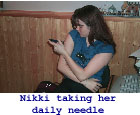NEWS
High School Students and Diabetes
By Mandy Plowman, Roncalli High School, Port Saunders NF
Three people at Roncalli Central High School with diabetes, two of them have type one diabetes, and have to take needles three times a day or more. The reason why type one is more common in teenagers is because “type one diabetes relates to the body’s inability to make insulin. Insulin is what we need to help our body use the energy from the food we eat, and what we eat and our lifestyles have changed so much” states Karen Tulk, public health nurse at the Rufus Guinchard Health Care Center.
 Nikki Ryan, a grade nine student at Roncalli who has had type one diabetes for ten years now, has to take at least three needles a day. She declared “taking needles everyday isn’t something that’s easy and its not something that is easy to get used to. Especially when you have to base you diabetes schedule around your daily school schedule. It’s hard for me to judge when and how much to take in my needle, where I play a lot of sports.” Angela House, also a grade nine student at Roncalli, who has had type one diabetes for five years now, states that “it doesn’t bother me anymore, taking needles, but at first when I was diagnosed with the disease I had a fear of it and hated it, but I have adjusted to it and accept it into my daily routine.” Nikki Ryan, a grade nine student at Roncalli who has had type one diabetes for ten years now, has to take at least three needles a day. She declared “taking needles everyday isn’t something that’s easy and its not something that is easy to get used to. Especially when you have to base you diabetes schedule around your daily school schedule. It’s hard for me to judge when and how much to take in my needle, where I play a lot of sports.” Angela House, also a grade nine student at Roncalli, who has had type one diabetes for five years now, states that “it doesn’t bother me anymore, taking needles, but at first when I was diagnosed with the disease I had a fear of it and hated it, but I have adjusted to it and accept it into my daily routine.”
People react to diabetes and taking needles in different ways. “Some people are scared of needles and some people think it’s gross taking them, but I tell them if you had to take it to survive it wouldn’t be so gross” says Nikki. “Other people on the other hand are interested in me taking my needles and wonder if they hurt and if I like doing it.”
Some people with diabetes don’t like everyone knowing they have diabetes, but Angela and Nikki don’t mind people knowing. Angela states “I don’t mind people knowing I have diabetes because if something happens they will know what to do and how to treat me.” Nikki says “usually people don’t even notice I have diabetes. I don’t bring a lot of attention to myself because from my point of view I could be worse off. It is not something that slows me down and I don’t expect people to feel sorry for me because I don’t like to depend on other people to get me thought this part of life.”
Alma House, mother of Angela, says that “the only thing that lets me feel safe with Angela going to school with diabetes and having to take needles is that I know she can control her diabetes, and her close friends understands the disease.”
Janet Ryan, mother of Nikki, doesn’t worry either about her daughter at school. “Nikki is very mature and educated about her disease. Most of her friends know she has it and know what to do if she has an insulin reaction. She also wears a medic-alert bracelet which gives us a sense of security.”
Nikki admits that “living with diabetes isn’t something that’s easy to get used to, but when you do get used to it you just accept it as part of your daily routine. If you accept this disease and the fact that you have it, it will be much easier to live with. Living with diabetes doesn’t have to affect your lifestyle a whole lot unless you let it. My lifestyle is somewhat different than others but not much different. I have to get up early in the morning to eat and take my needle but I usually go back to bed after. I just have to eat before I exercise and take needles before each meal. I also have to know how to adjust my diet and insulin to the way my day goes.”
|





